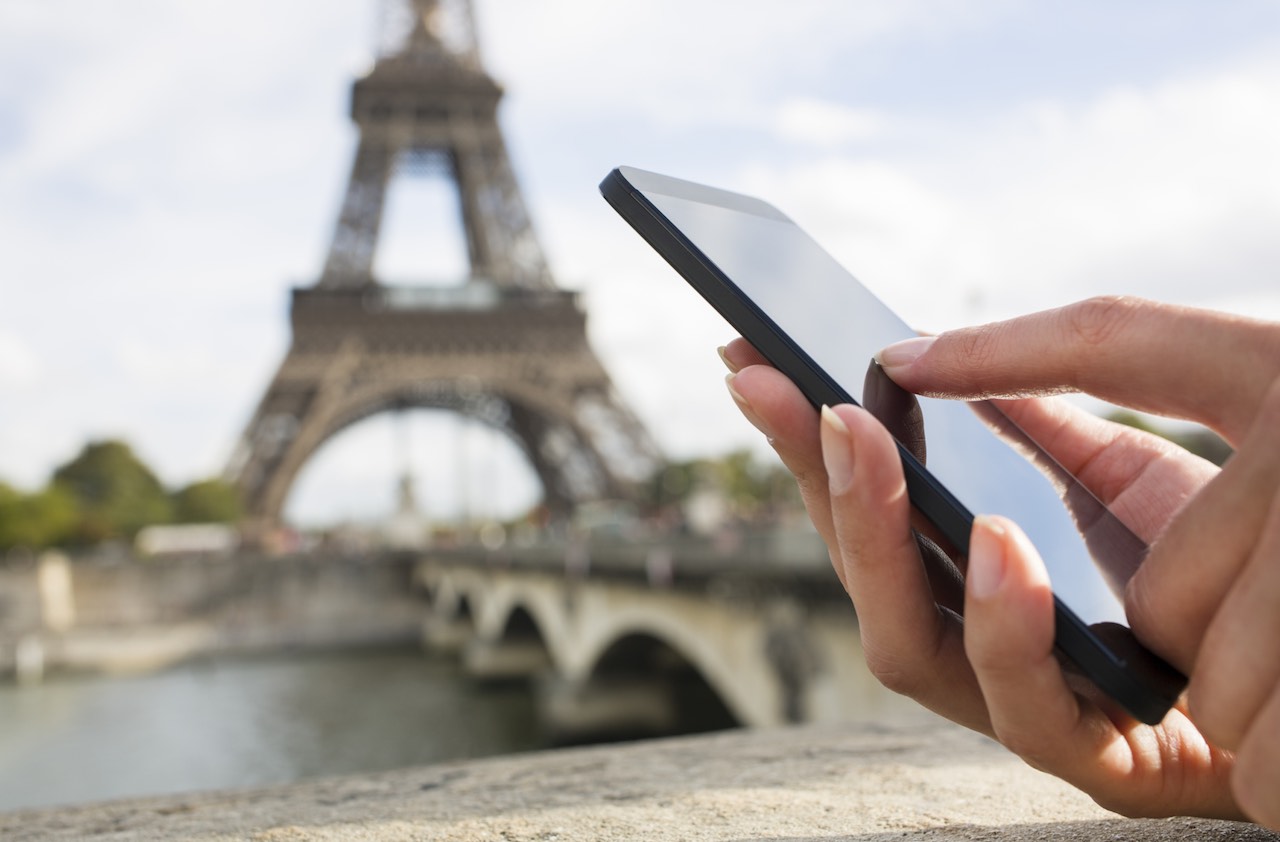5 Money-Smart Ways to Use Your Phone When Traveling Overseas
If you're traveling overseas, you have many new options for keeping in touch without spending a bundle.


Profit and prosper with the best of Kiplinger's advice on investing, taxes, retirement, personal finance and much more. Delivered daily. Enter your email in the box and click Sign Me Up.
You are now subscribed
Your newsletter sign-up was successful
Want to add more newsletters?

Delivered daily
Kiplinger Today
Profit and prosper with the best of Kiplinger's advice on investing, taxes, retirement, personal finance and much more delivered daily. Smart money moves start here.

Sent five days a week
Kiplinger A Step Ahead
Get practical help to make better financial decisions in your everyday life, from spending to savings on top deals.

Delivered daily
Kiplinger Closing Bell
Get today's biggest financial and investing headlines delivered to your inbox every day the U.S. stock market is open.

Sent twice a week
Kiplinger Adviser Intel
Financial pros across the country share best practices and fresh tactics to preserve and grow your wealth.

Delivered weekly
Kiplinger Tax Tips
Trim your federal and state tax bills with practical tax-planning and tax-cutting strategies.

Sent twice a week
Kiplinger Retirement Tips
Your twice-a-week guide to planning and enjoying a financially secure and richly rewarding retirement

Sent bimonthly.
Kiplinger Adviser Angle
Insights for advisers, wealth managers and other financial professionals.

Sent twice a week
Kiplinger Investing Weekly
Your twice-a-week roundup of promising stocks, funds, companies and industries you should consider, ones you should avoid, and why.

Sent weekly for six weeks
Kiplinger Invest for Retirement
Your step-by-step six-part series on how to invest for retirement, from devising a successful strategy to exactly which investments to choose.
Whether you're hopping over the pond for a weekend or hiking through Southeast Asia for a month, choose wisely before you leave to avoid coming home to a gigantic phone bill.
Add an international plan to your phone. It may not be the cheapest way to go, but it's the simplest, and some U.S. carriers are making their international deals more appealing. T-Mobile's bundle of free texting, free data and 20-cents-per-minute calls is now available in 145 countries. Sprint introduced similar bundles you can add to existing plans. And Verizon recently debuted TravelPass, which lets you transfer your domestic plan's talk, text and data allowances to more than 65 countries for a small daily fee ($2 for Canada and Mexico, $10 for all others). Be sure to confirm with your carrier that you will have coverage in your destination and that your phone will work abroad. Handset compatibility is more likely to be a problem with some older Sprint and Verizon devices that are "CDMA only," a technology not widely used around the world. If your carrier doesn't offer a favorable deal for your destination, don't rely on pay-as-you-go service unless you plan to use your phone sparingly; you'll shell out a couple of dollars or more per minute. And turn off data roaming altogether. Cruise passengers can check with their carrier for special packages or simply pay roaming fees if they must use their phones.
Load a free app. Free communication apps, such as Skype, WhatsApp, Viber and Facebook's Messenger, generally let you call, text and send photos and videos to other app users at no cost. Some even let you call mobile numbers or landlines for a few cents a minute -- and in the case of Google's Hangouts Dialer, most calls to the U.S. and Canada are free. The catch? You need to be connected to Wi-Fi. "I travel all the time and have no issues," says Logan Abbott, president of WireFly.com, a Web site that compares phone plans. If you go this route, set your phone on airplane mode to avoid accidentally racking up cellular charges, then turn on your Wi-Fi connection.
From just $107.88 $24.99 for Kiplinger Personal Finance
Become a smarter, better informed investor. Subscribe from just $107.88 $24.99, plus get up to 4 Special Issues

Sign up for Kiplinger’s Free Newsletters
Profit and prosper with the best of expert advice on investing, taxes, retirement, personal finance and more - straight to your e-mail.
Profit and prosper with the best of expert advice - straight to your e-mail.
Go native. You may want the security of knowing you can call, text or look up directions on your phone at all times. If you're visiting a single country, you own an unlocked phone and you plan to make mostly local calls, popping out your SIM card and substituting a local SIM card upon arrival can be economical. Prices vary widely, but Dave Dean, founder of TooManyAdapters.com, a travel technology Web site, says you'll generally pay between $10 and $50 to get a month's allotment of calls, texts and data. (Some countries make the setup process cumbersome, so check before you leave home.)
Hook up a mobile hot spot. If your phone is locked or you want to keep your U.S. phone number for calls and texts but avoid data roaming charges, you can buy or rent a mobile hot spot or "MiFi" device, a pocket-size gadget that creates a personal wireless connection. XCom Global, for example, charges $14.95 per day to connect up to 10 devices.
And for frequent fliers . . . A free Google Voice phone number rings all of your devices at once, transcribes voice mails, tracks missed calls, lets you dial international numbers cheaply and more.
Profit and prosper with the best of Kiplinger's advice on investing, taxes, retirement, personal finance and much more. Delivered daily. Enter your email in the box and click Sign Me Up.

-
 The New Reality for Entertainment
The New Reality for EntertainmentThe Kiplinger Letter The entertainment industry is shifting as movie and TV companies face fierce competition, fight for attention and cope with artificial intelligence.
-
 Stocks Sink With Alphabet, Bitcoin: Stock Market Today
Stocks Sink With Alphabet, Bitcoin: Stock Market TodayA dismal round of jobs data did little to lift sentiment on Thursday.
-
 Betting on Super Bowl 2026? New IRS Tax Changes Could Cost You
Betting on Super Bowl 2026? New IRS Tax Changes Could Cost YouTaxable Income When Super Bowl LX hype fades, some fans may be surprised to learn that sports betting tax rules have shifted.
-
 Why It's Worth Booking a Winter Vacation
Why It's Worth Booking a Winter VacationTravel Smart In the early months of the year, travel demand dips — and so do prices.
-
 5 Ways to Save on a Trip to the 2026 Olympics in Italy
5 Ways to Save on a Trip to the 2026 Olympics in ItalyA guide to going to the Milan-Cortina 2026 Winter Olympics without breaking the bank.
-
 The Best (and Worst) Airlines for Flight Delays and Cancellations
The Best (and Worst) Airlines for Flight Delays and CancellationsWhich airlines should you book and which should you avoid if you want to make it to your destination on time?
-
 Four Luxury Spa Resorts for Well-Heeled Travelers
Four Luxury Spa Resorts for Well-Heeled TravelersWe hand-picked these U.S. luxury spa resorts for their serenity, amenities and dedication to the comfort of older travelers.
-
 Child-Free Cruises Perfect For Your Retirement Celebration
Child-Free Cruises Perfect For Your Retirement CelebrationHow to find a bespoke ocean or river vacation for adults. Many of these options are smaller, charming river cruises, expeditions, or niche experiences.
-
 Noctourism: The New Travel Trend For Your Next Trip
Noctourism: The New Travel Trend For Your Next Trip"Noctourism" is a new trend of building travel and vacations around events and plans that take place at night. Take a look at some inspiring noctourism ideas.
-
 My Husband and I Retired at 67 With $3.2 Million, But He's Frugal About Travel. How Can I Convince Him to Loosen Up?
My Husband and I Retired at 67 With $3.2 Million, But He's Frugal About Travel. How Can I Convince Him to Loosen Up?We asked financial planning experts for advice.
-
 Cruise Lines Sue to Block Hawaii’s New Climate Tourism Tax
Cruise Lines Sue to Block Hawaii’s New Climate Tourism TaxState Tax Your vacation to the Aloha State could come at a higher price tag next year. Here’s why.